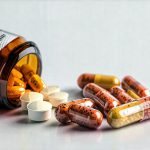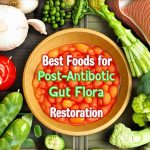Antibiotics, while life-saving in combating bacterial infections, are notoriously indiscriminate in their actions. They don’t just target harmful bacteria; they also wipe out beneficial microbes residing within our gut – the gut microbiome. This disruption can lead to a cascade of issues beyond the initial infection, impacting digestion, immunity, nutrient absorption, and even mental health. The aftermath of antibiotic use isn’t simply about waiting for things to “go back to normal”; it often requires proactive steps to rebuild a healthy and diverse gut ecosystem. Many individuals experience lingering symptoms like bloating, diarrhea, constipation, or increased susceptibility to infections long after finishing their course of antibiotics, highlighting the importance of dedicated post-antibiotic recovery protocols.
Understanding that the gut microbiome is not merely a collection of bacteria but a complex ecological system is crucial. It’s a dynamic community where different microbial species interact with each other and our bodies in intricate ways. Antibiotics fundamentally alter this delicate balance, creating opportunities for opportunistic pathogens to flourish while diminishing the population of beneficial microbes responsible for maintaining gut health. Restoring this balance isn’t about simply throwing probiotics at the problem; it’s about cultivating an environment that supports microbial diversity and resilience. It’s a process that requires a holistic approach encompassing dietary changes, strategic supplementation (when appropriate), and lifestyle adjustments.
Dietary Strategies for Gut Restoration
The foundation of any post-antibiotic recovery protocol is undoubtedly diet. What you eat directly influences the composition of your gut microbiome. A diet lacking in fiber, rich in processed foods, and high in sugar can hinder the restoration process, while a nutrient-dense diet abundant in whole foods actively promotes it. Focusing on prebiotic and probiotic-rich foods should be paramount. Prebiotics are essentially food for beneficial bacteria, encouraging their growth and activity. Excellent sources include:
– Garlic
– Onions
– Leeks
– Asparagus
– Bananas (slightly green are best)
– Oats
– Apples
Probiotic-rich foods contain live microorganisms that can help repopulate the gut. Fermented foods are particularly valuable, offering a natural source of probiotics:
– Yogurt (with live and active cultures – unsweetened is preferred)
– Kefir
– Sauerkraut (unpasteurized)
– Kimchi
– Kombucha
Beyond prebiotics and probiotics, emphasize easily digestible foods initially. Your gut may be sensitive after antibiotic use, so avoid overly stimulating or inflammatory foods like spicy dishes, excessive caffeine, alcohol, and large amounts of dairy (unless tolerated). Gradually reintroduce a wider variety of foods as your digestive system recovers. Hydration is also key, ensuring adequate water intake to support optimal gut function and detoxification. If you’re struggling with nausea during recovery, consider best pantry staples to have on hand.
A phased approach can be beneficial:
1. Begin with easily digestible foods like bone broth, steamed vegetables, and white rice during the initial phase (first few days).
2. Gradually introduce fermented foods and prebiotic-rich options as tolerated.
3. Slowly reintroduce other foods, monitoring for any digestive distress or adverse reactions. You can find light meals to help during this phase too.
Supporting Gut Healing & Immune Function
Beyond dietary changes, supporting overall gut healing is essential. Antibiotics can damage the gut lining, leading to increased intestinal permeability – often referred to as “leaky gut.” A compromised gut barrier allows undigested food particles and toxins to enter the bloodstream, potentially triggering inflammation and immune responses. Incorporating foods and supplements that promote gut barrier integrity can be incredibly beneficial.
L-glutamine, an amino acid, is known for its role in repairing damaged intestinal tissues. Collagen peptides, derived from animal sources, also provide building blocks for gut lining repair and contribute to overall connective tissue health. Furthermore, reducing stress levels plays a critical role. Chronic stress negatively impacts gut motility and microbial diversity. Practices like meditation, yoga, or spending time in nature can help manage stress and support gut health. Remember that the gut and brain are intricately connected – the gut-brain axis – so emotional well-being directly influences digestive function. If you’re experiencing unexplained gut pressure, it’s important to rule out other causes.
Finally, bolstering your immune system is crucial during post-antibiotic recovery. Antibiotics suppress not only harmful bacteria but also components of the immune system residing in the gut. Adequate sleep (7-9 hours per night), regular exercise, and a diet rich in vitamins and minerals are all essential for supporting immune function. Vitamin D deficiency is common and can impair immune responses, so consider getting your levels checked and supplementing if necessary (under the guidance of a healthcare professional).
Addressing Specific Symptoms
The symptoms experienced after antibiotic use vary widely depending on the individual, the type of antibiotic used, and the duration of treatment. Addressing these specific symptoms requires a tailored approach.
- Diarrhea: If diarrhea persists beyond a few days, consider incorporating binding agents like activated charcoal or bentonite clay (consult with a healthcare professional before using). Staying well-hydrated is paramount to prevent dehydration. Probiotic supplementation, specifically strains known to help restore gut motility and reduce inflammation, can also be beneficial.
- Bloating & Gas: Bloating often indicates imbalances in the gut microbiome. Reducing FODMAPs (fermentable oligosaccharides, disaccharides, monosaccharides, and polyols) – found in foods like onions, garlic, apples, and certain legumes – temporarily may help alleviate symptoms. However, eliminating FODMAPs long-term isn’t generally recommended without guidance from a healthcare professional.
- Constipation: Adequate hydration and increasing fiber intake gradually are crucial for relieving constipation. Gentle exercise can also stimulate gut motility. Consider incorporating magnesium citrate (consult with a healthcare professional first) to help soften stools. If you’ve recently overeaten and need meal ideas, there are options for gentle recovery.
Probiotic & Prebiotic Supplementation – A Nuanced Approach
While dietary sources of probiotics and prebiotics should be the cornerstone of recovery, supplementation can sometimes provide targeted support. However, it’s essential to approach probiotic supplementation cautiously. Not all probiotics are created equal. Different strains have different effects, and what works for one person may not work for another. A broad-spectrum probiotic containing multiple strains is often preferable, but consider focusing on strains known to be depleted by antibiotics or those that address specific symptoms you’re experiencing.
Prebiotic supplements can also be helpful, especially if dietary intake is insufficient. Inulin and fructooligosaccharides (FOS) are common prebiotic supplements, but start with a low dose to avoid digestive upset. Always consult with a healthcare professional before starting any new supplement regimen. They can help you choose appropriate strains and dosages based on your individual needs and medical history. Remember that supplementation is intended to complement dietary changes, not replace them. For short-term gut recovery, low-fiber recipes can be especially helpful.
Long-Term Gut Health Maintenance
Restoring gut health isn’t a one-time event; it’s an ongoing process. Even after symptoms subside, maintaining a healthy microbiome requires consistent effort. Prioritize a diverse, whole-food diet rich in fiber and fermented foods. Manage stress levels effectively through mindfulness practices or other relaxation techniques. Limit antibiotic use to only when absolutely necessary, as prescribed by a healthcare professional. Consider periodic gut health assessments (stool testing) to monitor your microbiome’s composition and identify any potential imbalances. Focusing on lifestyle factors that support overall well-being – adequate sleep, regular exercise, and strong social connections – will also contribute significantly to long-term gut health. If you suspect issues happen only at night, it’s worth investigating further with a professional. By adopting these practices, you can build a resilient gut ecosystem capable of withstanding future challenges and supporting your overall health for years to come.


















